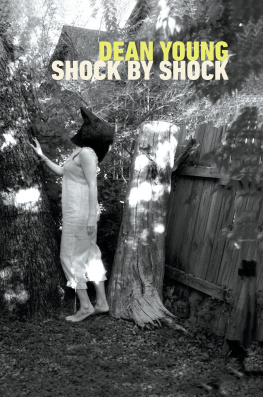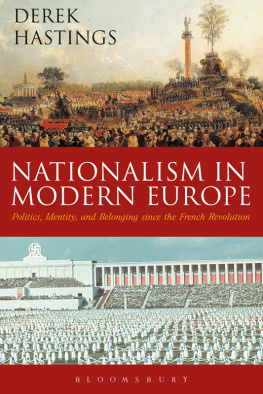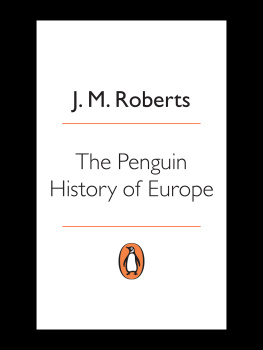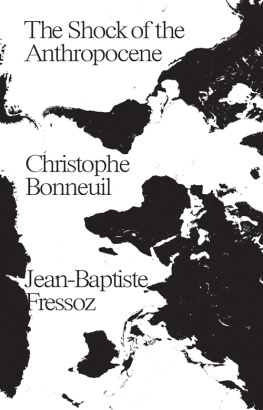Copyright 2015 by Arktos Media Ltd.
All rights reserved. No part of this book may be reproduced or utilised in any form or by any means (whether electronic or mechanical), including photocopying, recording or by any information storage and retrieval system, without permission in writing from the publisher.
Printed in the United Kingdom.
First English edition published in 2015 by Arktos Media Ltd.
Original edition: Le choc de lhistoire: religion, mmoire, identit (Versailles: Via Romana, 2011).
Foreword
by Paul Gottfried
On May 21, 2013, Dominique Venner, confronted by events he could no longer control, committed suicide by shooting himself in the mouth in Notre Dame Cathedral in Paris. Venner left behind a suicide note, explaining his horror at the gay marriage law that French President Franois Hollande had pushed through the National Assembly. He further lamented the self-destruction of his country and of European civilisation in general, a course of events that he ascribed to, among other causes, the reduction of heterosexual marriage to just another choice, and to the unwillingness of Western Europeans to keep their countries from being resettled by Muslims.
Thus there died a brilliant historian, who had also been a soldier for lost causes in his youth. The two identities in Venners case were intertwined. In November 1956, Venner participated in a raid on the offices of the French Communist party in Paris in support of the freedom fighters in Hungary, who were combating a reinvasion by their Soviet occupiers. As a paratrooper, he had fought to keep Algeria French, and then, as a member of the Organisation of the Secret Army, he had tried to overthrow the government of Charles de Gaulle when the former French commander abandoned the French Algerian cause, for which he was jailed. Although Venner was rarely successful in the choices he made as a warrior, he saw himself as fighting for the European heritage as a man of the Right. As this collection of interviews produced near the end of his life makes clear, Venner believed that even in the face of rapid, unwelcome historical transformations, those of his persuasion were still free to commit themselves to what they considered to be just causes. Venner understood his voluntary death as a choice he made in the hope of underlining a grave threat, while departing the world on his own terms.
It is by no means accidental that a large part of this volume is devoted to Venners defence of suicide. Here the historian justifies a path that he himself would soon take. In his vindication of suicide, Venner relies exclusively on pagan authors. He believed that unlike its Christian successor, the Classical world had no problem with people ending their lives after careful consideration and in order to avoid an otherwise unbearable existence. Venner invokes the example of the Japanese author and admirer of Samurai culture, Yukio Mishima (19251970), who committed seppuku , in public view, as a social statement. Mishima, a Japanese traditionalist, was revolted by the triumph of Western liberalism and pacifism in his country and took his life to arouse others to combat the destruction of the traditional Japanese way of life. Other literary figures whose suicides Venner views as admirable attempts to end life as the actors saw fit are Henry de Montherlant (18951972) and Pierre Drieu La Rochelle (18931945). Both, like Venner, came out of the cultural and political Right in France.
One does not have to dig too deeply in order to discover that the interviewee prefers the pagan to the Christian world. He fully accepts Nietzsches view of the Christian tradition as the source of Western slave morality. Venner believed that the attempt to stave off social disintegration and the resettlement of Europe by Muslims from the Third World has been complicated by the eagerness of Christians to bow before a destructive fate out of moral conviction or misplaced guilt. Indeed, Christian churches were depicting the foreign invaders and the exhibitors of alternative lifestyles as the suffering just, for whom European Christians were urged to display loving acceptance.
If one explained to Venner that Christians had not always applied such teachings to their worldly situation, he would have answered that in an earlier age, Christians were still influenced by pagan legacies. They were still the descendants of Germanic and Latin tribes, and their scholars were still immersed in Classical works. Note that when Venner is asked to cite the seminal text out of which his civilisation sprang, it is not the Bible, but Homer and the Greek tragedies to which he points. He deplores the broken memory of the Western world, the inhabitants of which have been forced to espouse an alien religion.
Although Venner may be accused of having gone too far in identifying the entire Christian tradition with its present degenerate form, he correctly observes that paganism in no way previewed our present multicultural, feminist culture. The attempts by Christian traditionalists to blame what they find repulsive in our present age on a pagan revival, is clearly absurd. The pagan world was masculine and heroic, and before its decadence in the Roman Empire, emphasised both sharply defined gender roles and sexual modesty. Paganus , like agroikos in Greek, meant rustic or of the countryside, and those who were associated with this simple life, were thought to show special reverence for local deities. The pagan tradition did not create the social deterioration that Venner saw all around him and which he obviously abhorred. If true pagans had accepted the state of affairs that Venner rejected, it would not have been out of a guilt-tinged love for those who were displacing them and destroying their institutions. Rather they would have believed that they were dealing with something that was Unchangeable and Fated. Unlike Christians, pagans viewed historical change as operating in a cyclical fashion.
Among Venners many works on historical topics, there are several that should be mentioned to understand the range of his interests and interpretations. His Critical History of the Resistance may be unique in their critical discussion of the French Resistance that arose in response to the German occupation during the Second World War. Venner stresses the degree to which traditional French nationalists played heroic roles in this struggle, in contrast to the French Communists, who went from collaborating with the invaders to killing their enemies after the German evacuation. Such works go deeply against the most treasured fictions of the Leftist establishment, and any attempt to tell the truth here may be a futile enterprise, except for those few who will listen.
Venners work The Century of 1914 was his most widely acclaimed achievement. It was praised even in the Leftist press for its thoroughness and even-handedness.
Perhaps Venners most significant contribution to historiographical sanity was his founding and direction of two periodicals: Enqutes sur lHistoire and La Nouvelle Revue dHistoire . For anyone looking for alternatives to a profession now writhing under the weight of ideologically-driven fictions, Venners periodicals were and remain indispensable. Despite his well-known repugnance for the Christian religion, his magazines give little indication of this anti-Christian bias. Here, Venner treats Catholic counterrevolutionaries as serious thinkers and presents their religious as well as political views in a dispassionate manner. This may be another strength of Venner as a scholar: his ability to lay aside his emotional investments and to deal with ideas that were not his own. Considering how deeply engaged he was in what he viewed as the cause of European civilisation, this professionalism seems all the more remarkable.






